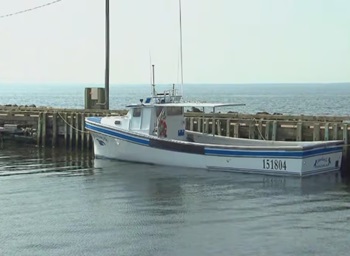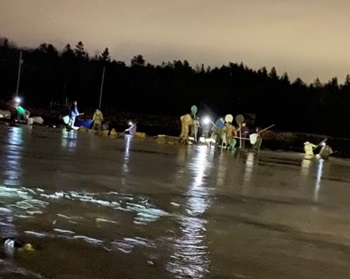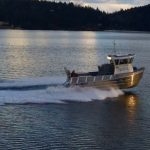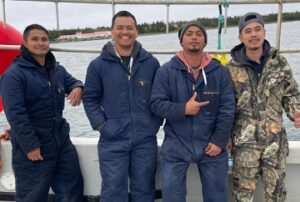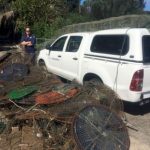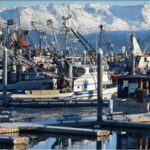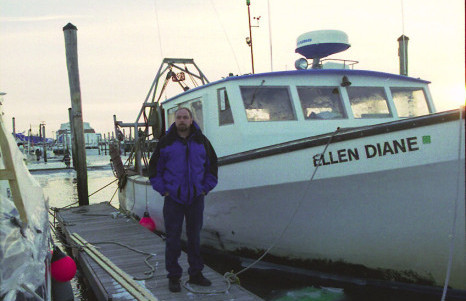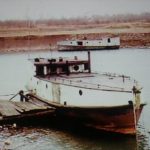Tag Archives: DFO
Organized crime linked to illegal lobster fishing ‘terrorizing the community,’ N.S. minister claims
 Nova Scotia’s fisheries minister says the federal failure to stop what he calls illegal out-of-season fishing in some of the most lucrative lobster grounds in the country has fuelled organized crime that is “terrorizing the community” along a stretch of the province’s southwest. Kent Smith made the comments in a letter last week to his federal counterpart, Fisheries Minister Diane Lebouthillier, in which he claims the illegal fishery has “entrenched itself” in the region of Clare and surrounding areas. “This is not related to Indigenous harvesting,” Smith said. “This is illegal lobster fishing that is causing havoc on the ground down there, causing havoc in the community and causing a lot of fear and anxiety in Clare and Meteghan.” more, >>CLICK TO READ<< 15:50
Nova Scotia’s fisheries minister says the federal failure to stop what he calls illegal out-of-season fishing in some of the most lucrative lobster grounds in the country has fuelled organized crime that is “terrorizing the community” along a stretch of the province’s southwest. Kent Smith made the comments in a letter last week to his federal counterpart, Fisheries Minister Diane Lebouthillier, in which he claims the illegal fishery has “entrenched itself” in the region of Clare and surrounding areas. “This is not related to Indigenous harvesting,” Smith said. “This is illegal lobster fishing that is causing havoc on the ground down there, causing havoc in the community and causing a lot of fear and anxiety in Clare and Meteghan.” more, >>CLICK TO READ<< 15:50
Review of prosecutions in chaotic elver fishery finds cases are being pursued
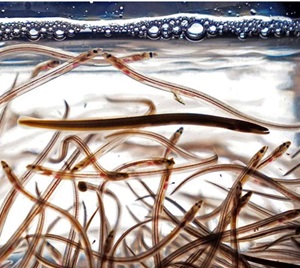 An internal review into whether federal Crown attorneys are refusing to prosecute infractions related to the turbulent baby eel fishery in the Maritimes has reportedly determined that proper discretion is being used and suggests at least two dozen cases have been brought to court. The examination was launched following a formal complaint by a commercial licence holder who alleged the Public Prosecution Service of Canada was failing to prosecute cases involving the unauthorized fishing of the juvenile eels, also known as elvers. In a recent email to the licence holder, David Antonyshyn, the deputy director of prosecutions, said an examination of 70 elver files referred by fisheries officers over a four-year period found about half proceeded to or were approved for prosecution. Others are still under review, while the remainder were declined. “There was not (and there is still not) any blanket policy not to prosecute particular individuals, or not to proceed with any particular type of offence,” Antonyshyn said in the email. more, >>CLICK TO READ<< 15:25
An internal review into whether federal Crown attorneys are refusing to prosecute infractions related to the turbulent baby eel fishery in the Maritimes has reportedly determined that proper discretion is being used and suggests at least two dozen cases have been brought to court. The examination was launched following a formal complaint by a commercial licence holder who alleged the Public Prosecution Service of Canada was failing to prosecute cases involving the unauthorized fishing of the juvenile eels, also known as elvers. In a recent email to the licence holder, David Antonyshyn, the deputy director of prosecutions, said an examination of 70 elver files referred by fisheries officers over a four-year period found about half proceeded to or were approved for prosecution. Others are still under review, while the remainder were declined. “There was not (and there is still not) any blanket policy not to prosecute particular individuals, or not to proceed with any particular type of offence,” Antonyshyn said in the email. more, >>CLICK TO READ<< 15:25
Lobster group files legal action over moderate livelihood fishery
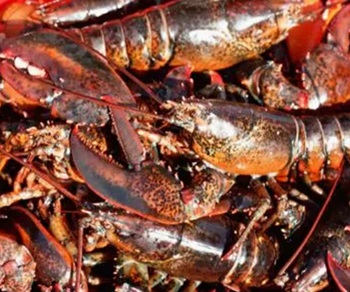 A lobster conservation group in southwestern Nova Scotia is taking legal action against Ottawa and the Sipekne’katik First Nation over out of season fishing. The Unified Fisheries Conservation Alliance (UFCA) filed a notice of action in Supreme Court in an effort to declare the summer fishery illegal. “The Supreme Court of Canada introduced the concept of a moderate livelihood fishery via the Marshall decisions but has never adequately defined the scope and limits that should apply,” said Michel Samson, counsel with the law firm Cox & Palmer. “This has created confusion between the DFO and the Public Prosecution Service as to what laws to enforce. It is imperative that our courts provide the rules and clarity required for both the commercial fishery and for First Nation communities.” more, >>CLICK TO READ<< 13:05
A lobster conservation group in southwestern Nova Scotia is taking legal action against Ottawa and the Sipekne’katik First Nation over out of season fishing. The Unified Fisheries Conservation Alliance (UFCA) filed a notice of action in Supreme Court in an effort to declare the summer fishery illegal. “The Supreme Court of Canada introduced the concept of a moderate livelihood fishery via the Marshall decisions but has never adequately defined the scope and limits that should apply,” said Michel Samson, counsel with the law firm Cox & Palmer. “This has created confusion between the DFO and the Public Prosecution Service as to what laws to enforce. It is imperative that our courts provide the rules and clarity required for both the commercial fishery and for First Nation communities.” more, >>CLICK TO READ<< 13:05
N.S. Liberals call for new task force to improve enforcement of lobster fishery
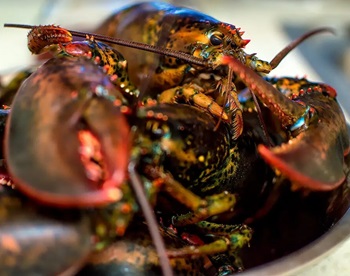 As top fishery officials from around the country arrive in PEI for the Canadian Council of Fisheries and Aquaculture Ministers meeting Nova Scotia’s Liberals are calling for a solution to the ongoing disputes over lobster fishing. Particularly in southwest Nova Scotia tensions have been running high with indigenous lobster fishermen and commercial operators. The Indigenous fishers have a right to a moderate livelihood fishery which was upheld by the Supreme Court. While commercial fishers argue that they need to still observe fishing seasons for the overall health of the lobster fishery. At times the altercations have become violent, which the Liberals say will only continue if things go unchanged. more, >>CLICK TO READ<< 07:42
As top fishery officials from around the country arrive in PEI for the Canadian Council of Fisheries and Aquaculture Ministers meeting Nova Scotia’s Liberals are calling for a solution to the ongoing disputes over lobster fishing. Particularly in southwest Nova Scotia tensions have been running high with indigenous lobster fishermen and commercial operators. The Indigenous fishers have a right to a moderate livelihood fishery which was upheld by the Supreme Court. While commercial fishers argue that they need to still observe fishing seasons for the overall health of the lobster fishery. At times the altercations have become violent, which the Liberals say will only continue if things go unchanged. more, >>CLICK TO READ<< 07:42
Commercial fishers demand stricter enforcement and penalties for illegal lobster sales – Federal and provincial governments need to step-up enforcement
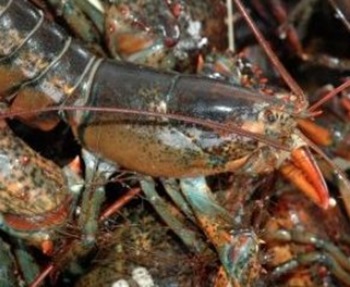 Uncertainty on the future of the commercial fishery will potentially put the sustainability of the lobster catch and jobs at risk according to the leaders of the Coalition of Atlantic and Quebec Fishing Organizations and the Unified Fisheries Conservation Alliance (UFCA). The upcoming meeting of fisheries ministers from across Canada is a unique opportunity to make sure the commercial fishery remains sustainable. Action is needed from both federal and provincial officials. For the Government of Canada, keeping independent enforcement officers on the water is critical to making sure no one fishes out of season. “Enforcing one set of rules for everyone is the key to a strong fishery. Impartial, independent enforcement officers at Department of Fisheries and Oceans is at the heart of a sustainable fishery,” according to Gordon Beaton, president of the Gulf Nova Scotia Fleet Planning Board. “We are concerned about potential changes to enforcement, we need more, not less, independent enforcement of the rules.” Science, not politics, should be driving decisions on the fishery. more, >>CLICK TO READ<< 17:40
Uncertainty on the future of the commercial fishery will potentially put the sustainability of the lobster catch and jobs at risk according to the leaders of the Coalition of Atlantic and Quebec Fishing Organizations and the Unified Fisheries Conservation Alliance (UFCA). The upcoming meeting of fisheries ministers from across Canada is a unique opportunity to make sure the commercial fishery remains sustainable. Action is needed from both federal and provincial officials. For the Government of Canada, keeping independent enforcement officers on the water is critical to making sure no one fishes out of season. “Enforcing one set of rules for everyone is the key to a strong fishery. Impartial, independent enforcement officers at Department of Fisheries and Oceans is at the heart of a sustainable fishery,” according to Gordon Beaton, president of the Gulf Nova Scotia Fleet Planning Board. “We are concerned about potential changes to enforcement, we need more, not less, independent enforcement of the rules.” Science, not politics, should be driving decisions on the fishery. more, >>CLICK TO READ<< 17:40
B.C. commercial fisherman fined $33K for harvesting catch in unique reefs
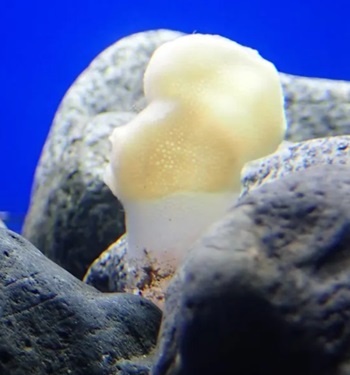 The owner of a commercial halibut vessel in British Columbia received more than $33,000 in fines for fishing in a marine protected area containing glass sponge reefs unique to the waters of the Pacific Northwest. Fisheries and Oceans Canada says a provincial court judge handed down the fine in May to Brent Belveal, who pleaded guilty to offences under the Fisheries Act. It says Belveal, operator of the vessel Gypsy Soul, harvested and sold his illegal catch from within the Queen Charlotte Sound Glass Sponge Reef Marine Protected Area near Bella Bella off B.C.’s central coast. The department describes the reefs as “globally unique ecosystems.” more, >>CLICK TO READ<< 10:39
The owner of a commercial halibut vessel in British Columbia received more than $33,000 in fines for fishing in a marine protected area containing glass sponge reefs unique to the waters of the Pacific Northwest. Fisheries and Oceans Canada says a provincial court judge handed down the fine in May to Brent Belveal, who pleaded guilty to offences under the Fisheries Act. It says Belveal, operator of the vessel Gypsy Soul, harvested and sold his illegal catch from within the Queen Charlotte Sound Glass Sponge Reef Marine Protected Area near Bella Bella off B.C.’s central coast. The department describes the reefs as “globally unique ecosystems.” more, >>CLICK TO READ<< 10:39
Canada lifts 30-year cod fishing ban off Newfoundland and Labrador to mixed reactions
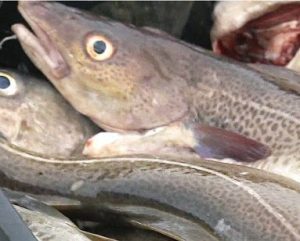 The Canadian federal government has lifted the 30-year fishing ban for Northern cod off the north and east coasts of Newfoundland and Labrador – a “historic milestone” for the seafood industry in Canada’s Maritimes. This means that commercial fishing for Northern cod will resume in NAFO Divisions 2J3KL for the 2024 season. “We will cautiously but optimistically build back this fishery with the prime beneficiaries being coastal and Indigenous communities throughout Newfoundland and Labrador,” said the Honourable Diane Lebouthillier, Minister of Fisheries, Oceans and the Canadian Coast Guard in a press release. “As a government, we remain steadfast in our commitment to fostering sustainable and economically prosperous fisheries that honor our shared resources for generations to come. I encourage all participants to prioritize safety and enjoy a rewarding season on the water.” more, >>CLICK TO READ<< 09:51
The Canadian federal government has lifted the 30-year fishing ban for Northern cod off the north and east coasts of Newfoundland and Labrador – a “historic milestone” for the seafood industry in Canada’s Maritimes. This means that commercial fishing for Northern cod will resume in NAFO Divisions 2J3KL for the 2024 season. “We will cautiously but optimistically build back this fishery with the prime beneficiaries being coastal and Indigenous communities throughout Newfoundland and Labrador,” said the Honourable Diane Lebouthillier, Minister of Fisheries, Oceans and the Canadian Coast Guard in a press release. “As a government, we remain steadfast in our commitment to fostering sustainable and economically prosperous fisheries that honor our shared resources for generations to come. I encourage all participants to prioritize safety and enjoy a rewarding season on the water.” more, >>CLICK TO READ<< 09:51
Who dumped a pile of lobsters alongside the highway?
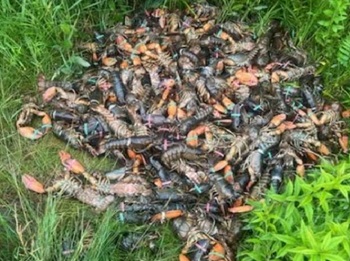 Ontario Provincial Police are looking for information after a large quantity of lobsters were found dumped along Highway 17 near Bonfield. On Tuesday, police started receiving calls about the lobsters alongside the highway. Officers found a large pile of lobsters. “It did look like quite an abundant number,” Const. Renne Taylor said. “Probably over 100 lobsters were there.” How they got there? Police admit they have no idea. As a result, they’re asking the public to get in touch if they have any details. more, >>CLICK TO READ<< 08:45
Ontario Provincial Police are looking for information after a large quantity of lobsters were found dumped along Highway 17 near Bonfield. On Tuesday, police started receiving calls about the lobsters alongside the highway. Officers found a large pile of lobsters. “It did look like quite an abundant number,” Const. Renne Taylor said. “Probably over 100 lobsters were there.” How they got there? Police admit they have no idea. As a result, they’re asking the public to get in touch if they have any details. more, >>CLICK TO READ<< 08:45
Herring quota in southwestern Nova Scotia, Bay of Fundy, reduced again
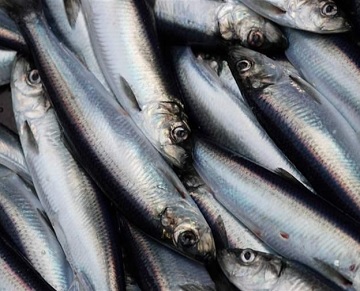 The Department of Fisheries and Oceans has again lowered the Atlantic herring quota in southwestern Nova Scotia and the Bay of Fundy, this time for 2024 to 2027. DFO has announced the total allowable catch for the fishery will be 16,000 tonnes per season over those four seasons. The 2023 allocation was 21,000 tonnes. “Atlantic herring, like many fisheries, faces challenges as a result of climate change, which has led to herring that are smaller in size and that have more difficulty surviving and reproducing in their ecosystem,” says a news release from the department. “We recognize the economic impacts this decision will have on the families and communities that rely on income from fishing and processing herring. But such a decision is necessary to ensure recovery and protect the resource for future generations,” said the DFO release. more, >>CLICK TO READ<< 16:40
The Department of Fisheries and Oceans has again lowered the Atlantic herring quota in southwestern Nova Scotia and the Bay of Fundy, this time for 2024 to 2027. DFO has announced the total allowable catch for the fishery will be 16,000 tonnes per season over those four seasons. The 2023 allocation was 21,000 tonnes. “Atlantic herring, like many fisheries, faces challenges as a result of climate change, which has led to herring that are smaller in size and that have more difficulty surviving and reproducing in their ecosystem,” says a news release from the department. “We recognize the economic impacts this decision will have on the families and communities that rely on income from fishing and processing herring. But such a decision is necessary to ensure recovery and protect the resource for future generations,” said the DFO release. more, >>CLICK TO READ<< 16:40
Spectre of draggers returning to cod fishery drives FFAW to call to reinstate moratorium
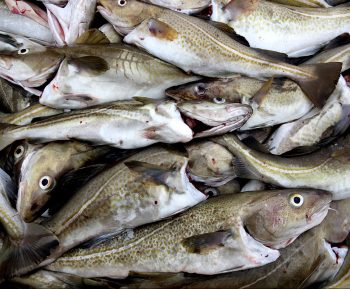 Newfoundland and Labrador’s fisheries union is calling on the federal government to revert its decision to end the moratorium on cod fishing and reinstate a stewardship fishery, a week after the federal Liberal government called the move “a historic milestone.” Greg Pretty, president of the Fish, Food and Allied Workers union (FFAW), told reporters in a press conference on Tuesday — the 32nd anniversary of the 1992 cod moratorium — there’s real concern that everything done over the last 32 years to rebuild the stock will be undone if offshore draggers, both Canadian and international, are allowed to fish cod in Newfoundland and Labrador waters again. more, >>CLICK TO READ<< 07:38
Newfoundland and Labrador’s fisheries union is calling on the federal government to revert its decision to end the moratorium on cod fishing and reinstate a stewardship fishery, a week after the federal Liberal government called the move “a historic milestone.” Greg Pretty, president of the Fish, Food and Allied Workers union (FFAW), told reporters in a press conference on Tuesday — the 32nd anniversary of the 1992 cod moratorium — there’s real concern that everything done over the last 32 years to rebuild the stock will be undone if offshore draggers, both Canadian and international, are allowed to fish cod in Newfoundland and Labrador waters again. more, >>CLICK TO READ<< 07:38
DFO warns Canadian fishers about participating in French halibut fishery
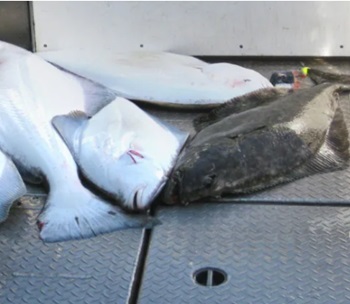 On Friday, Fisheries and Oceans Canada issued a statement saying it has requested formal consultations under the Proces-Verbal to reach an agreement related to quota allocation. The government describes Proces-Verbal as “a treaty that has allowed Canada and France/Saint Pierre and Miquelon to cooperate on the management of fish stocks that are present in our two domestic fishing waters.” The move follows word that a French-flagged ship recently landed 30 tonnes of halibut in Saint Pierre and Miquelon that is believed to be destined for the United States via the Port of Halifax. The fish was caught outside Canada’s 200-mile limit off Newfoundland and Labrador in an area known as the Northwest Atlantic Fisheries Organization Regulatory Area, according to industry sources. more, >>CLICK TO READ<< 06:46
On Friday, Fisheries and Oceans Canada issued a statement saying it has requested formal consultations under the Proces-Verbal to reach an agreement related to quota allocation. The government describes Proces-Verbal as “a treaty that has allowed Canada and France/Saint Pierre and Miquelon to cooperate on the management of fish stocks that are present in our two domestic fishing waters.” The move follows word that a French-flagged ship recently landed 30 tonnes of halibut in Saint Pierre and Miquelon that is believed to be destined for the United States via the Port of Halifax. The fish was caught outside Canada’s 200-mile limit off Newfoundland and Labrador in an area known as the Northwest Atlantic Fisheries Organization Regulatory Area, according to industry sources. more, >>CLICK TO READ<< 06:46

End of cod moratorium touted after 32 years as Ottawa approves small increase in commercial catch
Thirty-two years after the federal government announced a moratorium that shut down Newfoundland and Labrador’s cod industry, Fisheries Minister Diane Lebouthillier said Wednesday that it is reopening. But what the federal government described in a statement as the “historic return of the commercial northern cod fishery” will amount to just a small increase in fishing activity that had been allowed during the recent years of the moratorium. “Ending the northern cod moratorium is a historic milestone for Newfoundlanders and Labradorians,” Lebouthillier said in a statement. “We will cautiously but optimistically build back this fishery with the prime beneficiaries being coastal and Indigenous communities throughout Newfoundland and Labrador.” The Fisheries and Oceans announcement comes with political overtones. Video, more, >>CLICK TO READ<< 09:40
Mass mortality: A fish scientist follows a tip about die-offs at B.C. salmon farms
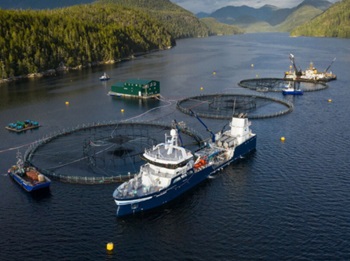 A tipster had told Proboszcz, a fisheries biologist at Watershed Watch Salmon Society, that salmon farms off the coast had been experiencing mysterious and massive die-offs and nobody was saying anything about it. “Yeah, it was a little crazy,” said Proboszcz of his decision to make the long trip. “But he didn’t know why they were dying.” Before Proboszcz left, a colleague had tracked a number of boats that were allegedly bringing fish all the way around the south end of Vancouver Island and into the Nanaimo area. But the boats had nearly finished shuttling all the fish, according to the anonymous source. Desperate, Proboszcz had tried to hire a skiff and even a helicopter to see what was going on. But nothing worked out, and so he decided to take matters into his own hands. Photos, more, >>CLICK TO READ<< 14:25
A tipster had told Proboszcz, a fisheries biologist at Watershed Watch Salmon Society, that salmon farms off the coast had been experiencing mysterious and massive die-offs and nobody was saying anything about it. “Yeah, it was a little crazy,” said Proboszcz of his decision to make the long trip. “But he didn’t know why they were dying.” Before Proboszcz left, a colleague had tracked a number of boats that were allegedly bringing fish all the way around the south end of Vancouver Island and into the Nanaimo area. But the boats had nearly finished shuttling all the fish, according to the anonymous source. Desperate, Proboszcz had tried to hire a skiff and even a helicopter to see what was going on. But nothing worked out, and so he decided to take matters into his own hands. Photos, more, >>CLICK TO READ<< 14:25
Sipekne’katik First Nation, federal government to begin mediation in effort to settle fishing dispute
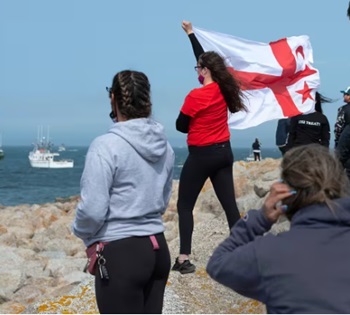 Litigation scheduled for next year that could have helped settle outstanding questions about treaty fishing rights related to the Marshall decisions will no longer happen, after a Nova Scotia Supreme Court judge granted a joint request from Sipekne’katik First Nation and the Attorney General of Canada to instead focus on mediation. The decision stems from a lawsuit Sipekne’katik filed in 2021 that wanted a declaration from the court that the federal Fisheries Act and regulations infringe on the treaty right to fish lobster for a moderate livelihood. That includes the prohibition on catching and holding lobsters without a licence and fishing outside of a commercial season. The trial was to start in May 2025, but this April, just as witness discovery was set to begin, the two parties served notice to the court that they’d reached an agreement to focus instead on mediation. They filed a joint request to have the trial dates and all other pretrial milestones adjourned. more, >>CLICK TO READ<< 12:37
Litigation scheduled for next year that could have helped settle outstanding questions about treaty fishing rights related to the Marshall decisions will no longer happen, after a Nova Scotia Supreme Court judge granted a joint request from Sipekne’katik First Nation and the Attorney General of Canada to instead focus on mediation. The decision stems from a lawsuit Sipekne’katik filed in 2021 that wanted a declaration from the court that the federal Fisheries Act and regulations infringe on the treaty right to fish lobster for a moderate livelihood. That includes the prohibition on catching and holding lobsters without a licence and fishing outside of a commercial season. The trial was to start in May 2025, but this April, just as witness discovery was set to begin, the two parties served notice to the court that they’d reached an agreement to focus instead on mediation. They filed a joint request to have the trial dates and all other pretrial milestones adjourned. more, >>CLICK TO READ<< 12:37
Lobster fishers want to see a crack down on poaching in southwestern Nova Scotia
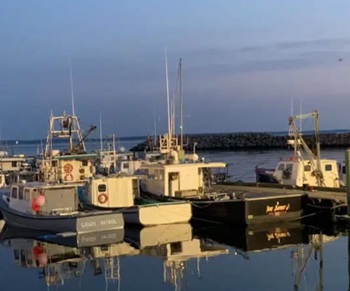 The issue was raised during a meeting in Yarmouth among industry members and the Department of Fisheries and Oceans (DFO). They’re worried more moderate livelihood fishing will dominate St. Mary’s Bay. First Nations fishers maintain their Treaty rights to fish. DFO has not authorized that fishery, but they do allow some Food, Social and Ceremonial licenses. Colin Sproul with the Unified Fisheries Conservation Alliance says catches were low in the bay during the fall season. “Everybody in southwestern Nova Scotia knows why that is. I think it’s incumbent on the government to act now, before lobster fishing in St. Mary’s Bay is a thing of the past,” said Sproul. more, >>CLICK TO READ<< 05:53
The issue was raised during a meeting in Yarmouth among industry members and the Department of Fisheries and Oceans (DFO). They’re worried more moderate livelihood fishing will dominate St. Mary’s Bay. First Nations fishers maintain their Treaty rights to fish. DFO has not authorized that fishery, but they do allow some Food, Social and Ceremonial licenses. Colin Sproul with the Unified Fisheries Conservation Alliance says catches were low in the bay during the fall season. “Everybody in southwestern Nova Scotia knows why that is. I think it’s incumbent on the government to act now, before lobster fishing in St. Mary’s Bay is a thing of the past,” said Sproul. more, >>CLICK TO READ<< 05:53
Inuit harvesters threaten legal action
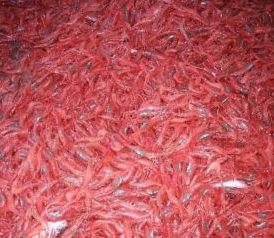 Monday, June 3rd, 2024 – Inuit harvesters from northern Labrador are threatening to take the Nunatsivut government to court if their 2024 inshore shrimp allocations aren’t restored, and an investigation ordered into why they were reassigned to an offshore factory-freezer trawler. “The spirit and intent of a communal licence is to provide local inshore Inuit with jobs and connect them to their culture and traditions, and that has been broken,” says Lisa Blandford, an Inuit harvester on behalf of the group. more, >>CLICK TO READ<< 10:21
Monday, June 3rd, 2024 – Inuit harvesters from northern Labrador are threatening to take the Nunatsivut government to court if their 2024 inshore shrimp allocations aren’t restored, and an investigation ordered into why they were reassigned to an offshore factory-freezer trawler. “The spirit and intent of a communal licence is to provide local inshore Inuit with jobs and connect them to their culture and traditions, and that has been broken,” says Lisa Blandford, an Inuit harvester on behalf of the group. more, >>CLICK TO READ<< 10:21
Commercial redfish fishery in Gulf of St. Lawrence expected to resume later this month
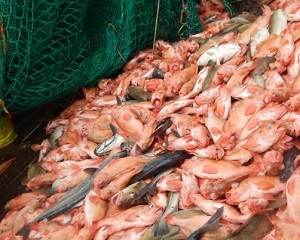 The Department of Fisheries and Oceans says the reopening of the redfish fishery in the Gulf of St. Lawrence could begin as early as June 15 and has announced the total allowable catch will be 60,000 tonnes for 2024-25. DFO announced the changes in a statement Friday. The department had said previously that the minimum allowable catch for the fishery would be 25,000 tonnes, but had not provided a cap. The commercial redfish fishery closed in 1995 over stock concerns. more, >>CLICK TO READ<< 13:26
The Department of Fisheries and Oceans says the reopening of the redfish fishery in the Gulf of St. Lawrence could begin as early as June 15 and has announced the total allowable catch will be 60,000 tonnes for 2024-25. DFO announced the changes in a statement Friday. The department had said previously that the minimum allowable catch for the fishery would be 25,000 tonnes, but had not provided a cap. The commercial redfish fishery closed in 1995 over stock concerns. more, >>CLICK TO READ<< 13:26
DFO Doubles Down on Redfish Giveaway: NL MPs Fail to Step-Up for Provincial Fishery
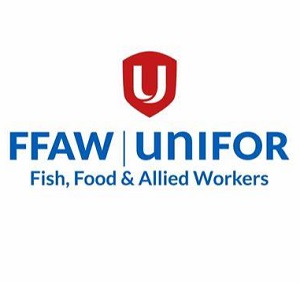 Late yesterday evening, DFO released the 2024-2025 Management Plan for redfish. The cowardly move came after the close of NL business hours and doubled down by taking owner-operator resources and handing them off to corporations. Earlier this spring, the original announcement made by Minister Lebouthillier gave away nearly 60% of the Canadian redfish quota to the corporate fleet, despite the inshore, owner-operator fleet having taken the lead on science and sustainability measures in recent years. With the Gulf shrimp fishery all but closed and non-shrimpers waiting for redfish to return, this is another blow to a group that’s been in survival mode for the last several years. “Once again, FFAW-Unifor members have been maligned by our two Ministerial Marionettes, Seamus O’Regan and Gudie Hutchings,” said FFAW-Unifor President Greg Pretty. “Sadly, their strings continue to be plucked by the Offshore Groundfish Oligarchy. >>CLICK TO READ<<11:49
Late yesterday evening, DFO released the 2024-2025 Management Plan for redfish. The cowardly move came after the close of NL business hours and doubled down by taking owner-operator resources and handing them off to corporations. Earlier this spring, the original announcement made by Minister Lebouthillier gave away nearly 60% of the Canadian redfish quota to the corporate fleet, despite the inshore, owner-operator fleet having taken the lead on science and sustainability measures in recent years. With the Gulf shrimp fishery all but closed and non-shrimpers waiting for redfish to return, this is another blow to a group that’s been in survival mode for the last several years. “Once again, FFAW-Unifor members have been maligned by our two Ministerial Marionettes, Seamus O’Regan and Gudie Hutchings,” said FFAW-Unifor President Greg Pretty. “Sadly, their strings continue to be plucked by the Offshore Groundfish Oligarchy. >>CLICK TO READ<<11:49
DFO issues warnings about lobster trap tampering in Nova Scotia
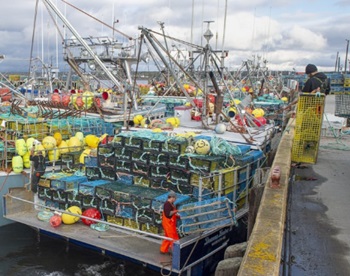 The federal Fisheries Department is investigating reports of gear tampering in lobster fishing areas in eastern Nova Scotia. The department issued a statement late Thursday saying Indigenous fishers taking part in officially sanctioned moderate livelihood fisheries have reported tampering in two fishing areas, as have non-Indigenous commercial fishers. The lobster fishing areas in question are 26A, which includes the eastern half of the Northumberland Strait, and area 27, which extends from the tip of Cape Breton near Meat Cove to an area on the east side of the island near Garbarus. more, >>CLICK TO READ<< 13:55
The federal Fisheries Department is investigating reports of gear tampering in lobster fishing areas in eastern Nova Scotia. The department issued a statement late Thursday saying Indigenous fishers taking part in officially sanctioned moderate livelihood fisheries have reported tampering in two fishing areas, as have non-Indigenous commercial fishers. The lobster fishing areas in question are 26A, which includes the eastern half of the Northumberland Strait, and area 27, which extends from the tip of Cape Breton near Meat Cove to an area on the east side of the island near Garbarus. more, >>CLICK TO READ<< 13:55
Lobster dispute settled a day after fishermen defy order to remove traps
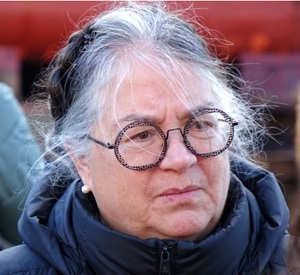 A brewing battle between the federal government and lobster fishermen in northern New Brunswick appears to have come to an end. A federal closure of lobster fishing zones in the Gulf of St. Lawrence off New Brunswick’s Acadian Peninsula was being defied by hundreds of fishermen refusing to remove their traps. A news release from the Department of Fisheries and Oceans sent Thursday evening says that lobster boats will be able to fish closer to shore. “I am pleased to see DFO has adjusted the closure requirements and harvesters can now set their traps up to the 10 fathom shallow water protocol management line for the remainder of the 15-day period,” said federal Fisheries and Oceans , in the release. more, >>CLICK TO READ<< 08:50
A brewing battle between the federal government and lobster fishermen in northern New Brunswick appears to have come to an end. A federal closure of lobster fishing zones in the Gulf of St. Lawrence off New Brunswick’s Acadian Peninsula was being defied by hundreds of fishermen refusing to remove their traps. A news release from the Department of Fisheries and Oceans sent Thursday evening says that lobster boats will be able to fish closer to shore. “I am pleased to see DFO has adjusted the closure requirements and harvesters can now set their traps up to the 10 fathom shallow water protocol management line for the remainder of the 15-day period,” said federal Fisheries and Oceans , in the release. more, >>CLICK TO READ<< 08:50
Sealing the Future: Revive and promote the seal hunt, federal report recommends
 When Paul McCartney campaigned against the seal hunt in 2006, it was unclear how reliant the Inuit and some coastal community economies were on the trade. Three years later, the European Union banned all seal products. The market for seal products was decimated, and with it came the rise of poverty and suicide within Inuit communities despite exemptions for their products, Steven Lonsdale of the Qikiqtani Inuit Association told the Senate Committee on Fisheries and Oceans late last year. Now, a new report from that committee acknowledges the harm done by the ban and recommends Ottawa must do more to revive the struggling industry in what it has branded a call to action. more, >>CLICK TO READ 07:40
When Paul McCartney campaigned against the seal hunt in 2006, it was unclear how reliant the Inuit and some coastal community economies were on the trade. Three years later, the European Union banned all seal products. The market for seal products was decimated, and with it came the rise of poverty and suicide within Inuit communities despite exemptions for their products, Steven Lonsdale of the Qikiqtani Inuit Association told the Senate Committee on Fisheries and Oceans late last year. Now, a new report from that committee acknowledges the harm done by the ban and recommends Ottawa must do more to revive the struggling industry in what it has branded a call to action. more, >>CLICK TO READ 07:40
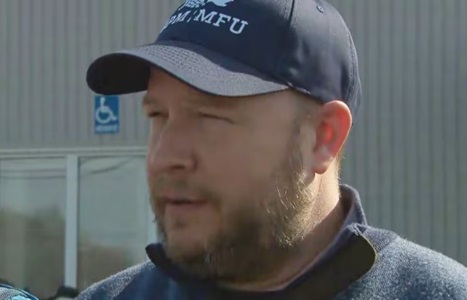
N.B. lobster fishermen defy DFO, leave traps in despite closure for North Atlantic right whales
Several fishing zones in the area were officially shut down early by the Department of Fisheries and Oceans at 5 p.m. Wednesday because of a North Atlantic right whale sighting. But at a meeting in Lamèque at the time of the deadline, about 200 members of the Maritime Fishermen’s Union decided not to remove their roughly 60,000 traps in the area. However, the fishermen say they will not go out Thursday in order to give the federal agency one more chance to negotiate. On Wednesday, a release from DFO said that the fishing zone closures, initially scheduled to last 10 days, would stay closed for the rest of the season. more, >>CLICK TO READ<< 06:56
Acadie-Bathurst MP Serge Cormier says he can no longer defend his government on right whale protection issue
 A northeast New Brunswick Liberal MP is joining the Maritime Fishermen’s Union in calling for a better balance between protecting endangered North Atlantic right whales and allowing commercial fishing operations. Acadie-Bathurst MP Serge Cormier criticized his government for extensive closures of fishing zones that he warned could result in “disastrous consequences” and economic losses of $25 to 30 million. “While we are trying to save an endangered species, these extreme measures are actually endangering our fishing industry and coastal communities,” Cormier said in a statement released Thursday. “I can no longer defend my government on this issue. I stand with the fishermen, the lobster and crab industry, the factory owners and workers, and the community members.” more, >>CLICK TO READ<< 13:14
A northeast New Brunswick Liberal MP is joining the Maritime Fishermen’s Union in calling for a better balance between protecting endangered North Atlantic right whales and allowing commercial fishing operations. Acadie-Bathurst MP Serge Cormier criticized his government for extensive closures of fishing zones that he warned could result in “disastrous consequences” and economic losses of $25 to 30 million. “While we are trying to save an endangered species, these extreme measures are actually endangering our fishing industry and coastal communities,” Cormier said in a statement released Thursday. “I can no longer defend my government on this issue. I stand with the fishermen, the lobster and crab industry, the factory owners and workers, and the community members.” more, >>CLICK TO READ<< 13:14
Entangled North Atlantic right whale prompts fishing closure in Gulf of St. Lawrence
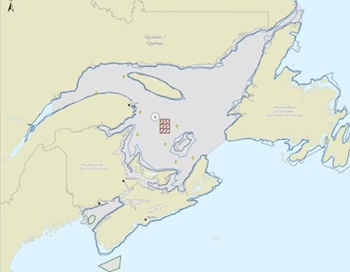 Fisheries and Oceans Canada has temporarily shut down part of the Gulf of St. Lawrence to non-tended, fixed-gear fishing after an endangered North Atlantic right whale with gear entangled around its mouth was spotted northeast of New Brunswick Friday. The whale was seen northeast of the Acadian Peninsula and northwest of Quebec’s Magdalen Islands during routine aerial surveillance and was many nautical miles from land, Fisheries and Oceans Canada said in a news release Monday. It’s the first sighting of a North Atlantic right whale in Canadian waters this season, according to the release. more, >>CLICK TO READ<< 06: 56
Fisheries and Oceans Canada has temporarily shut down part of the Gulf of St. Lawrence to non-tended, fixed-gear fishing after an endangered North Atlantic right whale with gear entangled around its mouth was spotted northeast of New Brunswick Friday. The whale was seen northeast of the Acadian Peninsula and northwest of Quebec’s Magdalen Islands during routine aerial surveillance and was many nautical miles from land, Fisheries and Oceans Canada said in a news release Monday. It’s the first sighting of a North Atlantic right whale in Canadian waters this season, according to the release. more, >>CLICK TO READ<< 06: 56
MPA’s: DFO seeks to reassure fishermen after ‘scary’ map released of potential protected areas
 A member of the Fisheries Department’s marine planning group was publicly challenged in Nova Scotia this week to guarantee marine protected areas will not harm the region’s inshore lobster fishery. Marty King appeared Thursday before Argyle municipal council in southwestern Nova Scotia where several areas are under consideration for protection. His appearance followed the release of DFO’s marine conservation network plan — a map with dozens of potential protected sites on the Atlantic coast of Nova Scotia and the Bay of Fundy. King repeatedly stressed coastal conservation areas would have no effect on the lobster fishery. “Hopefully we’re getting the message out more and more that an MPA [marine protected area] doesn’t mean no fishing,” he said. more, >>CLICK TO READ<< 08:49
A member of the Fisheries Department’s marine planning group was publicly challenged in Nova Scotia this week to guarantee marine protected areas will not harm the region’s inshore lobster fishery. Marty King appeared Thursday before Argyle municipal council in southwestern Nova Scotia where several areas are under consideration for protection. His appearance followed the release of DFO’s marine conservation network plan — a map with dozens of potential protected sites on the Atlantic coast of Nova Scotia and the Bay of Fundy. King repeatedly stressed coastal conservation areas would have no effect on the lobster fishery. “Hopefully we’re getting the message out more and more that an MPA [marine protected area] doesn’t mean no fishing,” he said. more, >>CLICK TO READ<< 08:49
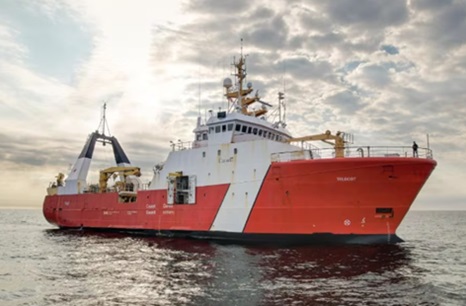
Waters off Scotian Shelf are cooling while scientists wonder if decade-long warming trend is over
In recent years, warming temperatures have grabbed headlines, with record highs being set throughout the region. Recently, on the Scotian shelf, it has moved in the other direction. “It is really interesting,” Beazley said in a wharfside interview at the Bedford Institute of Oceanography. “We did see a continuation of the trend that we observed in 2023, which was the temperatures are actually returning to normal or even below normal conditions in some areas. It’s getting cooler.” Since 2012, ocean temperatures off Nova Scotia at depth have been consistently warmer — by about two degrees above normal. more, >>CLICK TO READ<< 09:29
Staggered lobster starts don’t suit all fishers
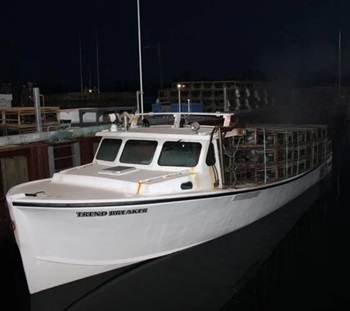 For the second straight year, PEI’s north and south side lobster zones had their setting days on different dates, but not everyone agrees with it. David Sansom, port manager at Red Head Harbour in Morell, said he isn’t a fan of not starting on the same day. However, he said data shows the offshore area Morell fishes, between Naufrage and Covehead harbours, has been one of the coldest on the Island in recent years, which affects lobster movement. Starting dates are influenced by many factors, including temperature on the bottom, weather and the tides. The north side had April 29 as their tentative starting date but several days of strong north winds delayed their season by almost a week until this past Sunday. Photos, more, >>CLICK TO READ<< 08:10
For the second straight year, PEI’s north and south side lobster zones had their setting days on different dates, but not everyone agrees with it. David Sansom, port manager at Red Head Harbour in Morell, said he isn’t a fan of not starting on the same day. However, he said data shows the offshore area Morell fishes, between Naufrage and Covehead harbours, has been one of the coldest on the Island in recent years, which affects lobster movement. Starting dates are influenced by many factors, including temperature on the bottom, weather and the tides. The north side had April 29 as their tentative starting date but several days of strong north winds delayed their season by almost a week until this past Sunday. Photos, more, >>CLICK TO READ<< 08:10






